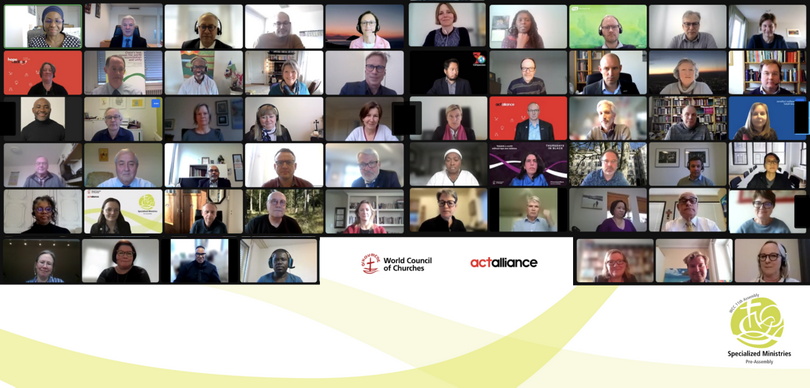“The Pre-assembly recognized this moment as an opportunity for transformational change. It addressed three critical issues confronting humanity and creation: overcoming racism, discrimination and xenophobia; the rise of populism; and the climate emergency. All three are framed by complex crises that manifest locally and globally,” reads the final message of the event.
The online pre-assembly, hosted in collaboration with ACT Alliance, came soon after the ACT Alliance General Assembly in 2021 and built on some of its outcomes related to the climate crisis, power relations, discrimination, racism, fundamentalism and democracy.
The final message, which will be presented to the WCC 11th Assembly in August, also stresses that, where the voices and experiences of those at the margins are ignored or suppressed, the engagement in Christian diakonia must centre on its prophetic calling: “Together with the WCC member churches, we commit to live our responsibility to ensure that all voices are heard, knowing we must find ways to amplify those voices in civil society who seek to pursue the common good.”
Erik Lysen, director of International Affairs for the Church of Sweden and moderator of the ACT Alliance governing board, described how the group discussed three critical issues facing the ecumenical movement and the world at large: overcoming racism, the rise of populism and climate change.
“In our message to the WCC 11th Assembly in Karlsruhe, we state that the ecumenical commitment to promoting an anti-racist Christian faith and to start looking critically at policies and practices that uphold racist structures, must be renewed,” said Lysen. “We also deliberated on climate change and its devastating consequences around the world.”
"Our public witness cannot be authentic unless we address the inequities, discrimination and structural racism in our own organizations and the ecumenical movement,” said Patti Talbot, team leader of the Global Partnership Program of The United Church of Canada.
Talbot added that those gathered as Christians, and part of the global ecumenical family, know they are called to make common cause with all who are committed to compassion, peace and justice in the world, and to work together in the common task of caring for one another and the whole of God’s creation.
“In this pre-assembly, we committed to act, and act together. I think we went further, implying that acting together – with WCC member churches and with others of good will – is the only way humanity can address the global pandemic, deepening social fragmentation and discrimination, the frightening acceleration of the climate emergency and the impact of conflict and war in Ukraine and elsewhere,” she said.
“I was also struck by the shared recognition that transformation towards justice for all must begin with decolonizing ourselves and our own structures.”
Rev. Dr Dagmar Pruin, president, Brot für die Welt, described how inspiring it was to share a joint Christian faith in action with so many colleagues around the globe.
“To see the diversity and the unity behind it—I am grateful for the thorough organisation of the event,” said Pruin. “We, leaders of specialized ministries, really came together at a very critical moment. It is war in Europe, people are dying and suffering, so close to us in Germany.”
At the first moment there can only be mourning, said Pruin. "And on the other hand, I am so grateful that we as specialized ministries can also act, can help where help is possible and needed, and I am very much looking forward that we bring this dimension to Karlsruhe,” said Pruin. “It is good to hear that we as specialized ministries are not only welcome, but partners in the effort to make this special event a success. We hope to contribute to it meaningfully.”
The group also prayed for the war in Ukraine to come to an end, and for peace and protection of all civilians.
Read the final message of the pre-assembly of Specialized Ministries
Originally from the World Council of Churches
CCD reprinted with permission.












